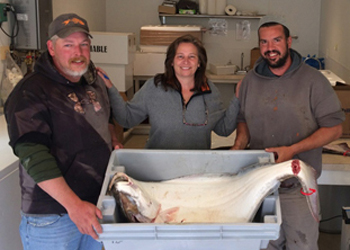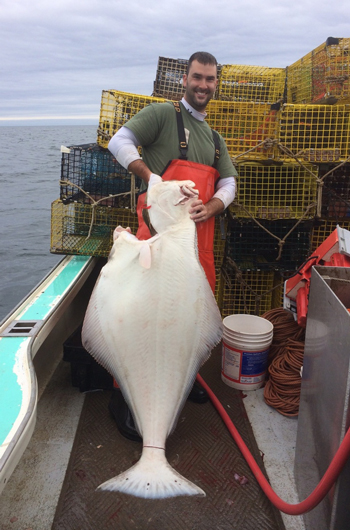Buxton’s Day Boat Fresh
by Sandra Dinsmore

The Buxtons, left to right, Josh Buxton, Susan Buxton, and Baren Yurchick at Buxton’s Day Boat Fresh processing facility in Deer Isle, Maine. The halibut in the box was 89 lbs. The fish arrived at Buxton’s shop at 2 pm and left her shop at 3:30 for delivery before 10 am the following morning.
Susan Buxton, a fifth-generation Deer Islander, and her husband Peter, a wooden boat builder whose family moved to Deer Isle in the 1920s, are go-getters. Together they own four businesses, two year-round and two seasonal. Pete has operated Buxton Boats since 1993 and in the summer has offered charters on his 37-foot lobster boat for 11 years and dinner cruises for seven years. Sue has managed their rental property for the last 12 years, and is in her second year of operating her seafood business, Day Boat Fresh.
She got her training by managing Ingrid Bengis Seafood (IBS) for 14 years, learning from one of the best-known seafood purveyors in the country. “The nature of the business,” Buxton explained, “is about building strong, lasting relationships. Chefs, purchase agents, and others in the hospitality world build a portfolio of trusted suppliers that they take with them as they move up the ladder, move on to different kitchens, or open their own restaurants.”
In early 2013, Buxton was forced to leave IBS due to various family commitments that no longer afforded her the time Bengis’s business required. The relationships, though, remained, and after much encouragement from chefs and other buyers, Buxton began to consider continuing as a seafood purveyor in a way that would suit her family dynamics. Bengis’s business had long since reached the saturation point with the number of restaurants it could supply.
Buxton realized that if she cleaned out her family’s hundred-year-old barn, she could use part of the building for a Hazard Analysis Critical Control Points-certified (HACCP) seafood-processing room: her seafood shop. (She is required by law to have certification identifying where the hazardous areas are within the specific business and taking all precautions to avert any problems, because just cutting a halibut to fit in a shipping box or transferring scallops from a fisherman’s five-gallon bucket into trays or tins is considered “processing.”) If the seafood business idea were to fall through, Buxton said she figured she could at least clear the barn of some 30 years of family accumulation.

Sedgwick fisherman Baren Yurchick,– who fishes out of Stonington, with a good size halibut.
Susan and Peter have two sons, Jared, 29, who travels and moves back and forth between California and Hawaii doing boat restoration and fine woodworking, and Joshua, 32, a former lobsterman who now works full-time for the seafood business. Susan said of Josh, “I really can’t say enough about how much the business relies on him. I can’t do the physical labor I did before, and he has a wonderfully fresh perspective on everything.” They are both about to take a course in QuickBooks and accounting.
As she and Josh worked on the barn, Buxton found herself designing what she wanted in a processing room: extra-heavy insulation, abundant room for expansion, lots of good, clear lighting, plenty of sink and counter space, and radiant-heated floors.
The barn finally empty—Buxton and her son took 15 truckloads of stuff to the island’s Take It or Leave It—Sue and Pete Buxton decided that, in addition to their then-existing three businesses, if they refinanced their primary house, they could afford to build Sue’s processing room and launch Buxton business number four.
The bank gave Sue a line of credit, and Pete and Josh started building the shop. Sue focused on setting up Fed Ex and UPS accounts, packaging, lining up her seafood suppliers—fishermen, crab-pickers, and mussel, oyster, and seaweed growers—and letting chefs, sous-chefs, restaurateurs, purchase agents, secretaries, and others in the hospitality world know she would be opening her own seafood business. By the end of December 2013 and just in time for the scallop season, Susan and Joshua Buxton opened Day Boat Fresh.
The seafood business requires a lot of money up front. Buxton pays her suppliers immediately. Restaurants do not. Also, she calls insurance “basically my financial gamble.” She explained, “Fed Ex considers any weather-related delays ‘an act of God,’ which voids the insurance.” (Ten thousand dollars worth of Maine lobster crashed into one of the Twin Towers on 9/11. The loss was considered part of the cost of doing business.)
As for what she charges for her premium-quality seafood, Buxton said, “I keep a low margin on everything, going for longevity in relationships. I need to be competitive with fish market pricing and quality. I pay a fair price, charge a fair price, have strict quality control expectations, track shipments through to their delivery, and send out information on any delays.”
During the interview, Buxton took a call from a high-end resort’s executive chef. He had seen a halibut she had sold to a chef at one of the resort’s restaurants, liked it, and was calling to find out what she sells.
As they talked, Buxton answered his questions and gave a clear picture of her business. She started by saying everything she sells is local. She explained that halibut comes in and goes out usually the same day unless the fish comes in after Fed Ex has left, and that halibut season runs from April through June.
“We’re very sustainably oriented here,” she said, explaining that each halibut fisherman receives 25 tags and is allowed to take 25 fish each season. (The day after the interview, fishermen brought her 14 halibut. Fishermen were in and out of the shop all afternoon. She said, “They love halibut season.”)
She sells six different types of oysters from area aquaculture farms and explained, “[Each] takes on a different flavor from one site to another, depending largely on the salinity of the water.” She also carries blue shell rope-cultured and Dutch-style mussels.
Peekytoe crabmeat from sand crabs is a by-product of the lobster catch, Buxton explained, saying. “[Fishermen] bring them home for their wives and daughters to process or sell them to other people who have licensed FDA (Food and Drug Administration) facilities. They cook and pick them; I buy it by the pound and it’s shipped out that day.”
Buxton told the chef she also sells scallops in season (December into April) and (shucked) soft shell clams and lobster year-round, adding proudly, “Stonington is the biggest lobster port in the country.”
In addition to seafood, Buxton also carries fiddlehead ferns in early spring, various mushrooms, three kinds of dried seaweed—dulse, wakame, and kombu—and Maine shrimp when the season is open, although it’s been closed the last two years.
She explained that all her boats are day boats. “There are simply no trip boats here,” she said. “We are on a bridged island. Fishermen go out daily; I pick out the premium of what I need from whatever they’ve caught that day and ship it out by Fed Ex to arrive by Priority overnight.”
Scallops, halibut, and shrimp are Buxton’s specialty items. They are seasonal and require more evening work. “Fishermen generally get in later with them,” Buxton said, explaining, “Buying, grading, packaging, and selling these items takes a lot of time.
“I don’t keep anything on site at my facility,” Buxton continued. “I order through my crab-pickers and my fishermen specifically how many pounds chefs pre-order and ship it off ASAP. We’re small here, but very good.”
FMI go to: buxtonboats@gmail.com, www.vrbo.com/284107 (rental property), or call 207-632-0249.
